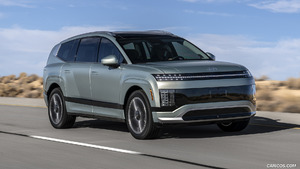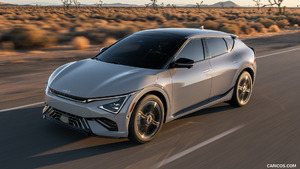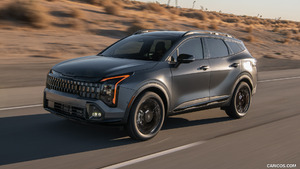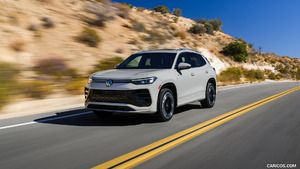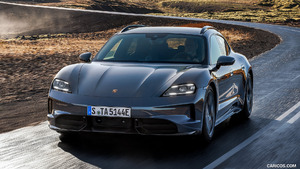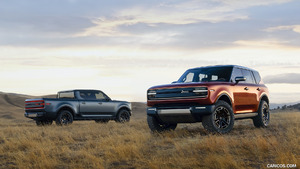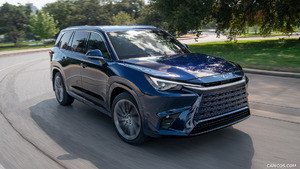2019 V-Class
In 2014, the Mercedes-Benz V-Class premiere saw a completely new approach to design, value appeal, comfort and safety being introduced into the MPV segment. The concept went on to be a true success: proof of this can be found in the 209,000 or so V-Class units that have been sold since its market launch in 2014, a sales record in 2018 with some 64,000 units, one of the youngest buyer groups at Mercedes-Benz and successful launches in other markets, especially in Asia. At the start of 2019, India was the latest V-Class market to be added to the equation. And the facelift will now make for a refreshing feel to the already successful model. Focal points include a re-styled and striking front-end design, as well as the introduction of the OM 654 four-cylinder diesel engine generation – with the V 300 d reaching the new top value of 176 kW (239 hp) (combined fuel consumption 6.3-5.9 l/100 km, combined CO2 emissions 165-154 g/km)1. Plus, the 9G-TRONIC automatic transmission is available for the first time, while safety and assistance systems, among them Active Brake Assist, have been brought up to the latest technological level. The new V-Class can be ordered in Europe from March 2019. Prices in Germany start from 36,990 euros (including 19 percent VAT). Furthermore, Mercedes-Benz Vans is continuing to evolve its eDrive@VANs electrification strategy and will soon be offering a fully-electric MPV.
New design and even greater comfort
The style and value appeal of the V-Class lead the way in the MPV segment. The V-Class designers in Stuttgart have used a series of targeted measures to give the MPV a new look which follows the design idiom of the current Mercedes-Benz passenger cars. The new V-Class has a broader appearance and an even stronger visual presence thanks to its new front end. This comes courtesy of a new bumper design with striking cooling air inlets and a new diamond structure in the radiator grille. The Mercedes star is positioned centrally in the radiator grille and framed by two slats in silver. The personalisation concept with the attractive AVANTGARDE and EXCLUSIVE lines continue to exist, while the AMG Line will become visually more powerful: it features a new diamond radiator grille with chrome pins and thus delivers a sporty note.
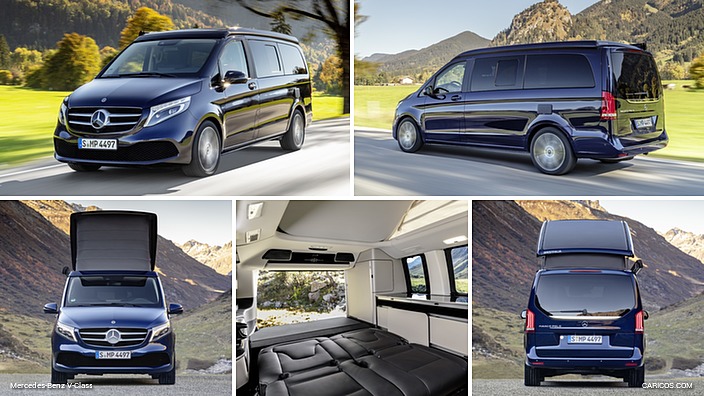 2019 Mercedes-Benz V-Class
2019 Mercedes-Benz V-Class
New paint colours in graphite grey metallic and selenite grey metallic expand the spectrum of the well-received black/white tones. Equally new is the optional paint colour steel blue. With the new colour hyacinth red metallic, the new V-Class also optionally makes an especially emotive statement. At the same time, the four new light-alloy wheel designs ensure a powerful and avantgarde appearance. They include 5-twin-spoke 17-inch light-alloy wheels painted in black with a high-sheen finish as well as 18-inch light-alloy wheels in tremolite grey with a high-sheen finish and 5-twin-spoke design or in black with a high-sheen finish and 5-spoke design. At the upper end of the new wheels portfolio are black-painted 19-inch 10-spoke light-alloy wheels with a high-sheen finish.
In the interior, too, the designers have been busy, transposing the interior design philosophy of the current Mercedes-Benz passenger car models into the new V-Class. The interior of the new V-Class follows the trend of modernity and clarity. In line with the facelift, the V-Class facelift presents itself with new air vents in a more sporty turbine look as well as new dials in the instrument cluster. Thanks to the reduced design, drivers can orientate themselves much more simply. The new upholstery and equipment colour tartufo nappa leather makes a modern and elegant statement. With Lugano leather and nappa leather, each available in black and silk beige, not to mention Santos black fabric, a total of six different upholsteries in light and dark colours is available. Modern and elegant can also be used to describe the new trim element in twin-stripe look which is used on the instrument panel and in the side trim elements. The trim elements in the piano lacquer, ebony wood, carbon fibre and brushed aluminium looks remain.
As part of the facelift, rear passengers can enjoy an especially comfortable space. The optionally available luxury seats for the first row of seats are a real treat and, just like in the S-Class, they offer a fully reclining function, back massage and climatisation. A journey in the new V-Class as a VIP shuttle thus feels more like a spa treatment after a stressful flight or business meeting.
New engine, new transmission – powerful and efficient
In line with the facelift, the Mercedes-Benz V-Class will be equipped with the four-cylinder OM 654 diesel engine in output variants including the following:
- The V 250 d with 140 kW (190 hp) and 440 Nm torque (combined fuel consumption 6.3-5.9 l/100 km, combined CO2 emissions 165-154 g/km)
- And – with new best values in its segment – the V 300 d with 176 kW (239 hp) and 500 Nm torque (combined fuel consumption 6.3-5.9 l/100 km, combined CO2 emissions 165-154 g/km)
In the acceleration phase, the V 300 d can briefly deliver an additional 30 Nm of torque ("overtorque") in addition to its 500 Nm of torque. The V 300 d accelerates from 0 to 100 km/h in 7.9 seconds. It can reach a top speed of 220 km/h.
The new engine generation is even more efficient and clean and offers further improved noise and vibration characteristics. It is pleasantly quiet inside the vehicle and annoying vibrations have been reduced.
Among the innovative characteristics of the new engine generation are the combination of an aluminium housing and steel pistons, the stepped recess combustion process and NANOSLIDE® cylinder wall coating for reducing friction within the engine. How efficient these measures are can be seen on the basis of the fuel savings of around 13 percent which the new V 250 d can boast in comparison with its predecessor model2.
The majority of components relevant to reducing emission are directly installed on the engine. The integrated technological approach comprising a new stepped recess combustion process, dynamic multiway exhaust gas recirculation and close-coupled exhaust gas aftertreatment facilitates low consumption with low emissions. Thanks to the near-engine, insulated position of the components, the exhaust-gas aftertreatment system enjoys low heat loss and advantageous working conditions. The measures include:
- High and low-pressure exhaust gas recirculation including cooling
- A diesel oxidation catalytic converter (DOC) reduces the carbon monoxide (CO) emissions and unburnt hydrocarbons (HC)
- A particle filter with SCR catalytic converter functionality (sDPF)
- An SCR catalytic converter (Selective Catalytic Reduction) for reducing nitrous oxides. Plus, ammonia is mixed into the exhaust gas upstream of the sDPF in the form of AdBlue®
- An additional Selective Catalytic Reduction catalytic converter (SCR) with ammonia slip catalyst (ASC) in the exhaust gas duct
The facelift will also see the V-Class optionally equipped with the 9G-TRONIC automatic transmission for the first time. The particularly comfortable and efficient converter automatic transmission replaces the 7G-TRONIC and is available as standard for the V 300 d (combined fuel consumption 6.3-5.9 l/100 km, combined CO2 emissions 165-154 g/km)1 and V 250 d (combined fuel consumption 6.3-5.9 l/100 km, combined CO2 emissions 165-154 g/km)1. The driver can use the DYNAMIC SELECT switch to select the drive programs "Comfort" and "Sport" and thus influence the shifting behaviour. Alternatively, "M" mode allows the driver to shift manually using the DIRECT SELECT steering wheel gearshift paddles.
All engine variants of the new V-Class are equipped as standard with rear-wheel drive, but 4MATIC permanent all-wheel drive is available as an option. In this way, the new V-Class can still move agilely on various types of terrain. The vehicle height remains under the two-metre mark even when equipped with all-wheel drive. Thus the new V-Class doesn't lose any of its daily usability and can still fit in regular garages as well as multi-storey and underground car parks problem-free.
New V-Class, even safer
With the standard feature Crosswind Assist, the driver receives support in keeping the V-Class on track even in the case of heavy crosswinds. Meanwhile, ATTENTION ASSIST which was introduced in the V-Class five years ago put the V-Class in a league of its own for safety standards in its segment. And the facelift model continues to build on this position.
In this respect, the new Active Brake Assist can now detect the risk of a collision with a vehicle driving in front and initially initiates a visual and acoustic warning. If the driver reacts, Active Brake Assist increases the brake pressure to suit the requirements of the situation. If the driver fails to react, the system initiates autonomous braking. In urban traffic the Active Brake Assist also reacts to stationary obstacles or pedestrians crossing. In this way, accidents can be avoided or, at the very least, the consequences thereof reduced.
Another new safety feature is the optional Highbeam Assist Plus which is available for the first time in the V-Class. In main-beam mode, Highbeam Assist Plus allows the driver to enjoy a permanent, broad illumination of the roadway without dazzling other road users. In the event of vehicles in front or oncoming traffic, the LEDs of the main-beam module are partially deactivated and thus create a U-shaped cut-out in the cone of light. The remaining areas of the roadway continue to be illuminated with the main-beam headlamps (partial main beam).
Facelift also for Mercedes-Benz campers and leisure vehicles
Be it in terms of style or value appeal, performance and efficiency or safety, the Marco Polo family based on the V-Class will also benefit from the entire scope of the first facelift to the Mercedes-Benz MPV at the same time as the base model. The compact Marco Polo and Marco Polo HORIZON campers and leisure vehicles also feature the new front-end design, the new paint colours and light-alloy wheels, as well as the new air vents and upholsteries. They are joined by the new diesel engine with a new peak of 176 kW (239 hp) (combined fuel consumption 6.8-6.1 l/100 km, combined CO2 emissions 180-160 g/km)1 as well as Active Brake Assist and Highbeam Assist Plus.
Expansion of the eDrive@VANs strategy
In the MPV segment, Mercedes-Benz Vans will soon be taking the next step and will be the first premium manufacturer to offer a fully-electric model. Thus Mercedes-Benz Vans will consistently expand its comprehensive eDrive@VANs strategy. With the eVito already available and the eSprinter due for market launch in the second half of 2019, the range of fully-electric vehicles will then be extended to include a model series for private use.
Mercedes-Benz Vans will provide an initial outlook on the electric future of its MPV at the Geneva International Motor Show with the near-series study „Concept EQV“, which will celebrate its premiere there.
---Front-187493-1024x768.jpg)
---Front-187493-120x90.jpg)
---Front-Three-Quarter-187494-120x90.jpg)
---Front-Three-Quarter-187495-120x90.jpg)
---Front-Three-Quarter-187496-120x90.jpg)
---Front-Three-Quarter-187497-120x90.jpg)
---Front-187498-120x90.jpg)
---Rear-187499-120x90.jpg)
---Front-Three-Quarter-187500-120x90.jpg)
---Front-Three-Quarter-187501-120x90.jpg)
---Rear-Three-Quarter-187502-120x90.jpg)
---Top-187503-120x90.jpg)
---Front-Three-Quarter-187504-120x90.jpg)
---Side-187505-120x90.jpg)
---Front-187506-120x90.jpg)
---Side-187507-120x90.jpg)
---Front-Three-Quarter-187508-120x90.jpg)
---Side-187509-120x90.jpg)
---Front-Three-Quarter-187510-120x90.jpg)
---Front-Three-Quarter-187511-120x90.jpg)
---Front-Three-Quarter-187512-120x90.jpg)
---Detail-187513-120x90.jpg)
---Detail-187514-120x90.jpg)
---Detail-187515-120x90.jpg)
---Side-187516-120x90.jpg)
---Rear-Three-Quarter-187517-120x90.jpg)
---Rear-Three-Quarter-187518-120x90.jpg)
---Front-Three-Quarter-187519-120x90.jpg)
---Rear-Three-Quarter-187520-120x90.jpg)
---Side-187521-120x90.jpg)
---Rear-187522-120x90.jpg)
---Front-187523-120x90.jpg)
---Headlight-187524-120x90.jpg)





---Front-Three-Quarter-187530-120x90.jpg)
---Rear-Three-Quarter-187531-120x90.jpg)
---Front-Three-Quarter-187532-120x90.jpg)
---Front-Three-Quarter-187533-120x90.jpg)
---Rear-Three-Quarter-187534-120x90.jpg)
---Front-Three-Quarter-187535-120x90.jpg)
---Rear-Three-Quarter-187536-120x90.jpg)
---Side-187537-120x90.jpg)
---Front-187538-120x90.jpg)
---Rear-187539-120x90.jpg)
---Front-Three-Quarter-187540-120x90.jpg)
---Rear-Three-Quarter-187541-120x90.jpg)
---Side-187542-120x90.jpg)
---Front-187543-120x90.jpg)
---Rear-187544-120x90.jpg)
---Front-Three-Quarter-187545-120x90.jpg)
---Front-Three-Quarter-187546-120x90.jpg)
---Front-Three-Quarter-187547-120x90.jpg)
---Front-Three-Quarter-187548-120x90.jpg)
---Front-Three-Quarter-187549-120x90.jpg)
---Front-Three-Quarter-187550-120x90.jpg)
---Front-Three-Quarter-187551-120x90.jpg)
---Detail-187552-120x90.jpg)







---Front-Three-Quarter-187560-120x90.jpg)
---Rear-Three-Quarter-187561-120x90.jpg)

---Front-Three-Quarter-187563-120x90.jpg)
---Rear-Three-Quarter-187564-120x90.jpg)



---Front-Three-Quarter-187568-120x90.jpg)
---Side-187569-120x90.jpg)
---Front-Three-Quarter-187570-120x90.jpg)
---Front-Three-Quarter-187571-120x90.jpg)
---Front-Three-Quarter-187572-120x90.jpg)
---Rear-Three-Quarter-187573-120x90.jpg)
---Rear-Three-Quarter-187574-120x90.jpg)
---Rear-Three-Quarter-187575-120x90.jpg)
---Rear-Three-Quarter-187576-120x90.jpg)
---Front-Three-Quarter-187577-120x90.jpg)
---Front-Three-Quarter-187578-120x90.jpg)
---Rear-Three-Quarter-187579-120x90.jpg)
---Front-Three-Quarter-187580-120x90.jpg)
---Rear-Three-Quarter-187581-120x90.jpg)
---Front-Three-Quarter-187582-120x90.jpg)
---Front-Three-Quarter-187583-120x90.jpg)
---Front-Three-Quarter-187584-120x90.jpg)
---Front-Three-Quarter-187585-120x90.jpg)
---Front-Three-Quarter-187586-120x90.jpg)
---Front-Three-Quarter-187587-120x90.jpg)
---Front-Three-Quarter-187588-120x90.jpg)
---Front-Three-Quarter-187589-120x90.jpg)
---Front-Three-Quarter-187590-120x90.jpg)
---Front-Three-Quarter-187591-120x90.jpg)
---Front-Three-Quarter-187592-120x90.jpg)
---Front-Three-Quarter-187593-120x90.jpg)
---Side-187594-120x90.jpg)
---Side-187595-120x90.jpg)
---Front-Three-Quarter-187596-120x90.jpg)
---Side-187597-120x90.jpg)
---Front-Three-Quarter-187598-120x90.jpg)
---Front-Three-Quarter-187599-120x90.jpg)
---Engine-187600-120x90.jpg)
---Tail-Light-187601-120x90.jpg)








---Front-Three-Quarter-187610-120x90.jpg)
---Rear-Three-Quarter-187611-120x90.jpg)
---Front-Three-Quarter-187612-120x90.jpg)
---Front-Three-Quarter-187613-120x90.jpg)
---Front-Three-Quarter-187614-120x90.jpg)
---Front-Three-Quarter-187615-120x90.jpg)
---Front-Three-Quarter-187616-120x90.jpg)
---Rear-Three-Quarter-187617-120x90.jpg)
---Rear-Three-Quarter-187618-120x90.jpg)
---Front-Three-Quarter-187619-120x90.jpg)
---Rear-Three-Quarter-187620-120x90.jpg)
---Front-Three-Quarter-187621-120x90.jpg)
---Front-Three-Quarter-187622-120x90.jpg)
---Front-Three-Quarter-187623-120x90.jpg)
---Front-Three-Quarter-187624-120x90.jpg)
---Rear-Three-Quarter-187625-120x90.jpg)
---Side-187626-120x90.jpg)
---Front-Three-Quarter-187627-120x90.jpg)
---Side-187628-120x90.jpg)
---Side-187629-120x90.jpg)
---Front-Three-Quarter-187630-120x90.jpg)
---Front-Three-Quarter-187631-120x90.jpg)
---Rear-Three-Quarter-187632-120x90.jpg)
---Badge-187633-120x90.jpg)


---Front-Three-Quarter-187636-120x90.jpg)
---Front-Three-Quarter-187637-120x90.jpg)
---Side-187638-120x90.jpg)
---Front-187639-120x90.jpg)
---Rear-187640-120x90.jpg)
---Front-Three-Quarter-187641-120x90.jpg)
---Front-Three-Quarter-187642-120x90.jpg)
---Front-Three-Quarter-187643-120x90.jpg)
---Front-187644-120x90.jpg)
---Front-187645-120x90.jpg)
---Front-187646-120x90.jpg)
---Front-Three-Quarter-187647-120x90.jpg)
---Front-Three-Quarter-187648-120x90.jpg)
---Front-187649-120x90.jpg)
---Front-187650-120x90.jpg)
---Front-Three-Quarter-187651-120x90.jpg)
---Front-Three-Quarter-187652-120x90.jpg)
---Front-Three-Quarter-187653-120x90.jpg)
---Rear-Three-Quarter-187654-120x90.jpg)
---Front-187655-120x90.jpg)
---Grille-187656-120x90.jpg)
---Detail-187657-120x90.jpg)


---Front-Three-Quarter-187660-120x90.jpg)
---Front-Three-Quarter-187661-120x90.jpg)
---Front-Three-Quarter-187662-120x90.jpg)
---Front-Three-Quarter-187663-120x90.jpg)
---Front-Three-Quarter-187664-120x90.jpg)
---Front-Three-Quarter-187665-120x90.jpg)
---Front-187666-120x90.jpg)
---Rear-187667-120x90.jpg)
---Side-187668-120x90.jpg)
---Side-187669-120x90.jpg)
---Side-187670-120x90.jpg)
---Front-Three-Quarter-187671-120x90.jpg)
---Front-Three-Quarter-187672-120x90.jpg)
---Front-187673-120x90.jpg)
---Front-187674-120x90.jpg)
---Side-187675-120x90.jpg)
---Side-187676-120x90.jpg)
---Front-Three-Quarter-187677-120x90.jpg)
---Front-Three-Quarter-187678-120x90.jpg)
---Front-Three-Quarter-187679-120x90.jpg)
---Front-Three-Quarter-187680-120x90.jpg)
---Front-Three-Quarter-187681-120x90.jpg)
---Front-Three-Quarter-187682-120x90.jpg)
---Front-Three-Quarter-187683-120x90.jpg)
---Front-Three-Quarter-187684-120x90.jpg)
---Rear-Three-Quarter-187685-120x90.jpg)
---Side-187686-120x90.jpg)
---Side-187687-120x90.jpg)
---Side-187688-120x90.jpg)
---Side-187689-120x90.jpg)
---Top-187690-120x90.jpg)
---Top-187691-120x90.jpg)
---Side-187692-120x90.jpg)
---Front-Three-Quarter-187693-120x90.jpg)
---Front-Three-Quarter-187694-120x90.jpg)
---Rear-Three-Quarter-187695-120x90.jpg)
---Front-Three-Quarter-187696-120x90.jpg)
---Rear-Three-Quarter-187697-120x90.jpg)
---Side-187698-120x90.jpg)
---Tail-Light-187699-120x90.jpg)
---Detail-187700-120x90.jpg)








